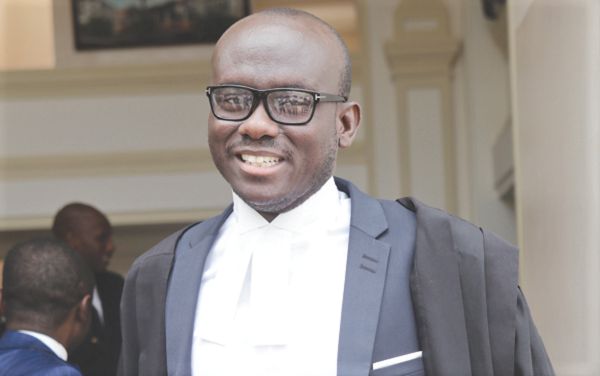
Deputy A-G defends construction of National Cathedral
A deputy Attorney-General, Mr Godfred Yeboah Dame,has defended the government’s decision to spearhead the construction of a National Cathedral, arguing that it did not violate any law.
In his legal argument before the Supreme Court yesterday, he said the construction of the Cathedral does not change the country’s status as a secular country.
He was making a case for the government in a suit filed by Mr James Kwabena Bomfeh, the acting General Secretary of the Convention People’s Party (CPP), which is challenging the state’s involvement in the construction of the National Cathedral.
It is Mr Bomfeh’s case that Ghana is a secular state and, therefore, the government must remain neutral in all religious matters.
He is of the view that it was unconstitutional for the government to spearhead the construction of a National Cathedral for Christians, and also establish a Hajj Board to facilitate the pilgrimage of Muslims to Mecca
No breach of the law
But in his legal argument, Mr Dame submitted that the government, through the construction of the National Cathedral, had not restricted anyone from practising his or her religion and was, therefore, not in breach of Article 35 clause 5 of the 1992 Constitution or any constitutional provision which promoted religious freedom.
He further argued that the plaintiff had misconstrued the idea of secularism because secularism did not mean that the state should “completely disregard or ignore the religiosity of the people in the taking and implementation of policy decisions for a just and free society”.
It is also the contention of the deputy A-G that the plaintiff had failed to invoke the jurisdiction of the court, explaining that he had not raised any cause of action to necessitate the intervention of the apex court.
“Although the plaintiff identifies the setting up of a Hajj Board and the construction of a National Cathedral as constitutional violations, he does not identify the specific constitutional breach by the State and, therefore, still do not disclose a cause of action,’’ he argued.
Mr Dame further disagreed with the plaintiff’s argument that it was wrong for President Akufo-Addo to release public lands for the construction of the Cathedral.
“Article 257 (1) of the 1992 Constitution vests public lands in the President. How can a person, who has authority over public lands, be prohibited from allocating the land,’’ he argued.
Plaintiff’s legal argument
In his legal argument, counsel for Mr Bomfeh, Dr Aziz Bamba, submitted that since Ghana was a secular state, the government must not involve itself in religious activities and must treat all religions equally.
“If the government cannot support all religions then it must stop supporting some to the detriments of others,’’ he argued.
At that point, Mr Justice Jones Dotse, one of the seven justices hearing the case, asked counsel what were the features of a secular state, and if the government’s involvement in the Hajj pilgrimage was not to prevent the challenges associated with the private organisation of Hajj.
“Previously, when you drive by the airport, you will see our Muslim brothers and sisters going for Hajj stranded, you think the state cannot intervene to prevent this?’’ he asked counsel.
Dr Bamba answered that the state must accommodate religion, but it must do so for all religions equally.
He said for the idea of the National Cathedral to emanate from the government was unconstitutional.
“The Cathedral is being called the Cathedral for the state of Ghana. The Finance Minister in the budget statement said the government of Ghana would provide seed money.
This is state entanglement in religion and is unconstitutional, particularly when other religions have not been given the same opportunity,’’ he argued.
Judgement
Meanwhile, the court will on January 16, 2019 determine whether or not the government’s decision to spearhead the construction of a National Cathedral or the establishment of a Hajj Board is constitutional.
The seven-member panel is presided over by Justice Sophia Adinyera, with Justices Dotse, Anin Yeboah, Sule Gbadegbe, Vida Akoto-Bamfo, Anthony A. Benin and Samuel Marful-Sau as the members
Background
President Akufo-Addo cut the sod for the construction of the National Cathedral on March 6, 2017, as part of events that marked Ghana’s 60th independence anniversary.
Plans by the government to demolish houses, including those housing judges on the land around Ridge in Accra to make way for the construction of the cathedral, generated a debate, with the public divided over the project.
Writer’s email: [email protected]